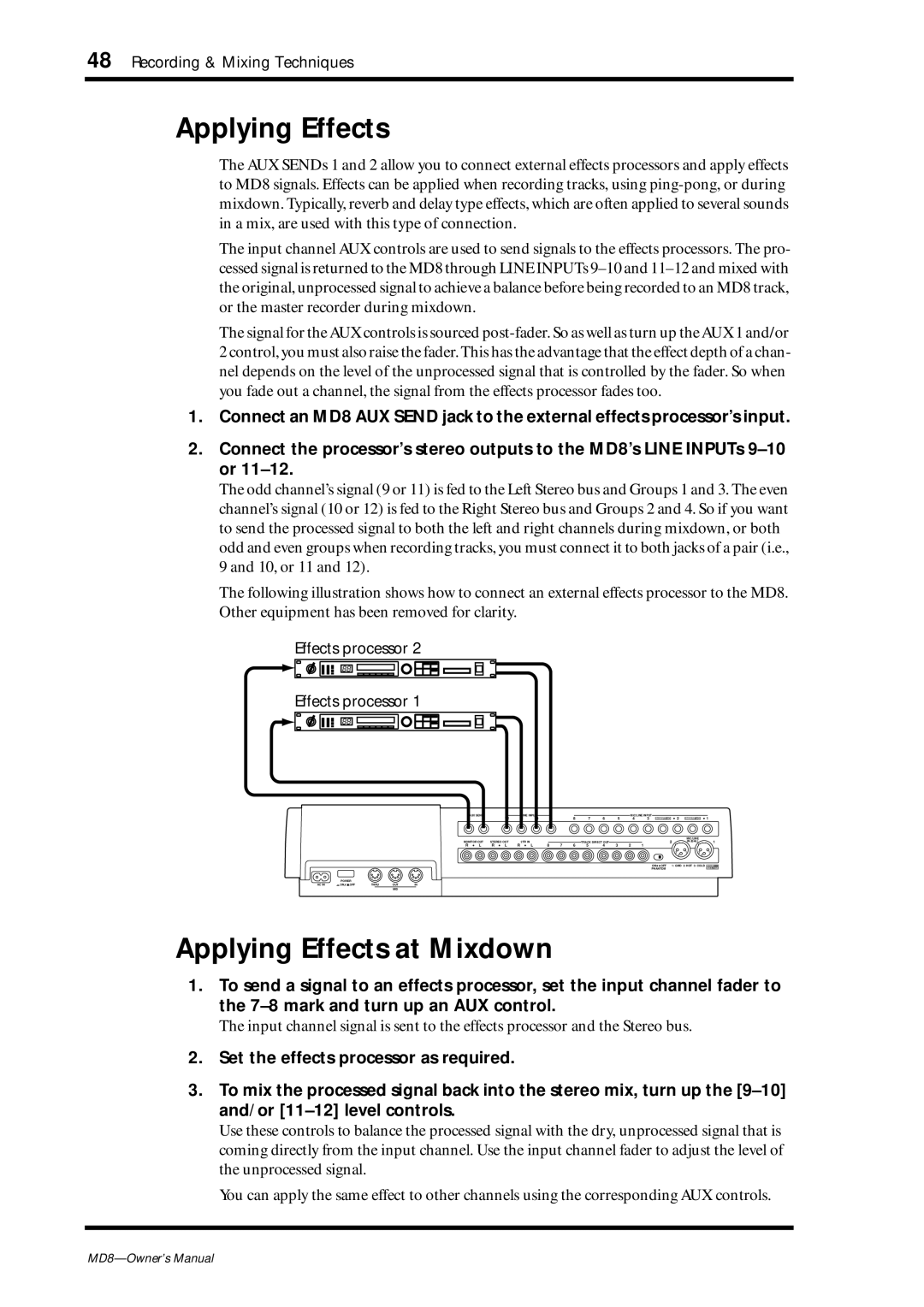
48 Recording & Mixing Techniques
Applying Effects
The AUX SENDs 1 and 2 allow you to connect external effects processors and apply effects to MD8 signals. Effects can be applied when recording tracks, using
The input channel AUX controls are used to send signals to the effects processors. The pro- cessed signal is returned to the MD8 through LINE INPUTs
The signal for the AUX controls is sourced
1.Connect an MD8 AUX SEND jack to the external effects processor’s input.
2.Connect the processor’s stereo outputs to the MD8’s LINE INPUTs
The odd channel’s signal (9 or 11) is fed to the Left Stereo bus and Groups 1 and 3. The even channel’s signal (10 or 12) is fed to the Right Stereo bus and Groups 2 and 4. So if you want to send the processed signal to both the left and right channels during mixdown, or both odd and even groups when recording tracks, you must connect it to both jacks of a pair (i.e., 9 and 10, or 11 and 12).
The following illustration shows how to connect an external effects processor to the MD8. Other equipment has been removed for clarity.
Effects processor 2
88
Effects processor 1
88
AUX SEND |
| 12 | LINE INPUT |
| 9 | 8 | 7 | 6 | 5 | MIC/LINE INPUT | 2 |
|
| 1 | ||||
2 | 1 |
| 11 | 10 |
| 4 | 3 | INSERT I/O | INSERT I/O | |||||||||
|
|
|
|
|
|
|
|
|
|
|
|
|
|
|
| MIC/LINE |
| |
MONITOR OUT | STEREO OUT | 2TR IN |
|
|
|
| TRACK DIRECT OUT |
|
|
| 2 |
|
| IN (BAL) | 1 | |||
R | L | R | L | R | L | 8 | 7 | 6 | 5 | 4 | 3 | 2 | 1 |
|
|
|
|
|
|
|
|
|
|
|
|
|
|
|
|
|
|
|
| 2 | 1 | 2 | 1 |
|
|
|
|
|
|
|
|
|
|
|
|
|
|
| 3 |
|
| 3 |
|
|
|
|
|
|
|
|
|
|
|
|
|
| ON OFF | 1: GMD 2: HOT 3: COLD DC48V | |||
|
|
|
|
|
|
|
|
|
|
|
|
|
| PHANTOM |
|
|
| MAX. 7mA |
POWER
AC IN | ON OFF | THRU | OUT | IN |
MID
Applying Effects at Mixdown
1.To send a signal to an effects processor, set the input channel fader to the
The input channel signal is sent to the effects processor and the Stereo bus.
2.Set the effects processor as required.
3.To mix the processed signal back into the stereo mix, turn up the
Use these controls to balance the processed signal with the dry, unprocessed signal that is coming directly from the input channel. Use the input channel fader to adjust the level of the unprocessed signal.
You can apply the same effect to other channels using the corresponding AUX controls.
